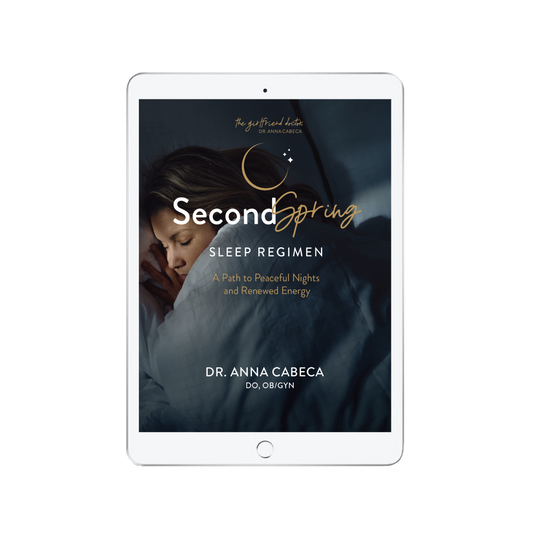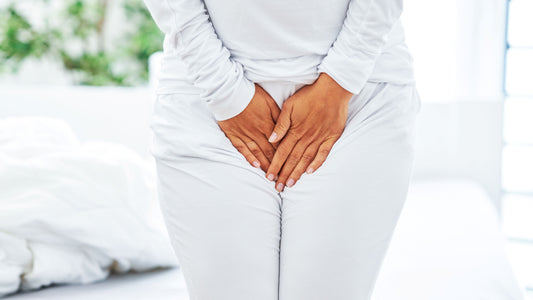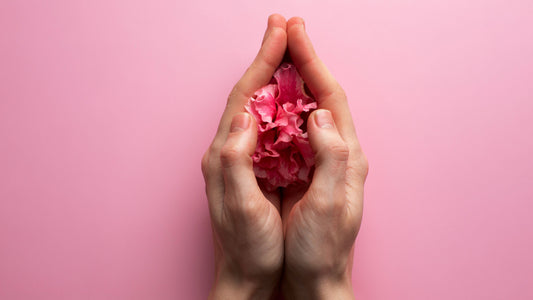It’s hard for me to believe that it has been several years since I created my internationally acclaimed feminine restorative cream, Julva ®.

When I initially developed Julva to address vaginal atrophy symptoms such as vaginal dryness, discomfort, diminished libido and urinary leaking, I had no idea how successful it would be and how it would transform so many women’s daily lives.
Today I want to update my community on what has been happening in the world of women’s sexual and pelvic health since the birth of Julva, as well as provide new research that continues to support its safety and health benefits.
By the way…see this article from 2017 if you would like to review the earlier research that went into my development of Julva, or you’d like to see summary charts comparing all of the available vaginal atrophy treatment options (moisturizers, lubricants, laser surgery, hormone therapy and more).
So let’s get started and discuss,
- Newer research (especially relating to women who have had breast cancer)
- The latest and greatest on Julva (what women are really saying!)
- What women’s health and pelvic health specialists are saying about Julva
- Other key aspects of vaginal health
Newer research (especially relating to women who have had breast cancer )
When I launched my topical vulvar cream Julva back in 2016 there was already a good deal of positive research relating to several of Julva’s key ingredients, including vaginally applied DHEA’s effectiveness in addressing vaginal atrophy symptoms.
Research had also found that DHEA wasn’t systemic like other hormone replacement therapy (oral HRT); it had been shown to stay localized near the point of application versus circulating in the blood. This improves its safety profile over traditional HRT, especially supportive of women having had breast cancer.
The great news is that subsequent research has confirmed all of the above.
Breast Cancer Research
More than 60% of postmenopausal women having breast cancer report symptoms of vaginal atrophy (most notably, vaginal dryness and pain). Many of these women cannot take hormone replacement therapy (oral HRT) due to cancer concerns and there haven’t been a lot of good options for them. But vaginally applied DHEA has shown to be a promising alternative.
Premenopausal women are also affected by vaginal dryness, either as a side effect of chemotherapy or due to an increased use of aromatase inhibitors, which leads to lower estrogen levels.
In my earlier blog article on this topic, Using Julva If You’ve Had Breast Cancer, I referenced a 2014 clinical trial that had resulted in positive data but was not yet published. The results of this clinical trial, involving 441 postmenopausal women who had previous breast or gynecologic cancer, were subsequently published and I will include that research article link here.
This 2014 clinical trial examined two questions:
- Does intravaginal DHEA have a positive effect on vaginal atrophy symptoms and sexual function beyond that offered by a vaginal moisturizer alone?
- Since DHEA is an inactive precursor to the production of active sex hormones (including estrogen) in specific tissue, would locally applied DHEA increase estrogenic activity in the blood?
The results concluded that there was no evidence of systemic estrogenic activity and that the vaginally applied DHEA significantly improved pain, overall sexual function, sexual desire and arousal, compared to the vaginal moisturizer alone.
This confirmed earlier research (Menopause, 2009) that found that intravaginal DHEA only impacted vulvar and vaginal cells and tissue locally where it was applied and was not found to circulate systemically.
Since then (2014) several additional follow-up studies have also resulted in the same findings. Intravaginal DHEA was found as being effective for vaginal atrophy symptoms while showing no increased risk to those having had cancer. More on this below.
Additional Research and Position Papers
Again, if you are interested in reading the research that went into my own evaluation of DHEA’s effectiveness, please refer back to my earlier 2017 article on DHEA and vaginal atrophy. That piece walks through other options for treating vaginal atrophy and compares them with DHEA in a number of categories. You might find this helpful. While some new products have come to the market in the different categories (moisturizers, lubricants, etc.) the summary comparisons are still quite accurate.
This earlier article contains research (pre-Julva) that substantiated DHEA’s effectiveness and showed that it will:
- Reduce vaginal dryness and irritation
- Strengthen vaginal musculature
- Increase bone mineral density
- Decrease pain during intercourse
- Increase arousal and libido, as well as sexual satisfaction.
More recent research includes,
- (2015) Study looked at the effects of intravaginal DHEA on the endometrium (tissue lining the uterus) in postmenopausal women. Results showed that the DHEA acted exclusively in the vagina and did not increase serum sex steroid levels
- (2016) This study was done by a true pioneer of DHEA research, F. Labrie (much of the earlier research on DHEA was published by him and his team) and focused on pain during sexual activity (known as dyspareunia). It again confirmed that intravaginally applied DHEA had strictly local action with no adverse effects and that there were highly statistically significant positive effects on four parameters including: vaginal pH, percentage of parabasal cells, percentage of superficial cells, and moderate to severe pain during sexual activity.
- (2016) A study showing symptom relief with estrogenic activity to be below normal postmenopausal values after a low daily dose (6.5mg) of DHEA (Prasterone).
- (2017) A comparison was done between intravaginal DHEA and estrogens. Labrie was on the research team for this study as well. Results found that the DHEA was as effective for treatment of vaginal atrophy symptoms without systemic effects.
- (2018) Clinical research finding positive effects on four parameters (including improvements in moderate to severe pain during sexual activity), the absence of significant drug-related adverse events, local versus systemic action, and a high benefit-to-risk ratio of DHEA (Prasterone) treatment.
- (2018) The American Society of Clinical Oncology (ASCO), in their 2018 Practice Guidelines for women with cancer and cancer survivors, recommended non-hormonal therapies and low-dose vaginal estrogen as initial treatments. They also recommended that should these women be taking aromatase inhibitors clinicians offer vaginal DHEA.
- (2018) Another study showing that vaginally applied DHEA has no systemic effects outside the postmenopausal range for hormone concentration. This study focused on women with a history of cancer and also evaluated the impacts on bone turnover and vaginal pH. There were more favorable effects compared to vaginal moisturizer relating to symptom relief and vaginal pH (there was no change in bone turnover in either population).
- (2018) A 12 week study that found that both vaginally applied DHEA and moisturizer provided vaginal atrophy relief, but only the DHEA resulted in significantly improved sexual health. Note that sexual health was measured by use of the Female Sexual Function Index (FSFI). The FSFI is a multi-dimensional measure of 19 categories that addresses the major domains of female sexual functioning, including desire, arousal, lubrication, orgasm, satisfaction, and pain.
- (2018) A good overview of treatment options for postmenopausal vaginal atrophy, includes vaginally applied DHEA.
- (2018) NAMS and the International Society for the Study of Women’s Sexual Health published a guideline for women with or at high risk for breast cancer stating that initial treatments should be non-hormonal or low-dose vaginal hormone therapies (after consulting with their oncologist). They cited research finding there was a slight increase in plasma estradiol to the lower half of postmenopause values after DHEA (Prasterone) administration that was well within normal ranges.
- (2019) This is a review focused on using intravaginal DHEA to treat moderate to severe dyspareunia. It discussed the development of the synthetic DHEA drug, Prasterone, which was approved in late 2016 by the US Food and Drug Administration (FDA) for the treatment of this condition.
- (2019) Another review focused on Prasterone (DHEA) and its effectiveness and safety profile.
- (2019) This is a position statement by the Polish Menopause and Andropause Society relating to the FDA approved vaginally applied DHEA product (Intrarosa®). I’m including it as it is a good overall review of much of the research behind DHEA.
- (2019) This is a good overview of the wide variety of treatment options for various vaginal atrophy symptoms and includes vaginally applied DHEA.
-
(2020) A detailed review of the research finding that intravaginal DHEA (Prasterone) is effective for the management of dyspareunia (pain during sexual activity) secondary to menopause. The article also discusses other current evidence relating to DHEA effectiveness in treating other symptoms such as vaginal dryness, decreased libido, decreased sexual satisfaction and a decreased ability to achieve orgasm.
-
(2020) A review of various treatment options for vaginal atrophy in which the authors concluded that vaginal DHEA was an effective and safe treatment.
-
(2022) A small pilot study of cancer patients receiving aromatase inhibitors found that vaginal health and vaginal atrophy symptoms such as vaginal dryness and pain during sexual activity improved and serum estradiol remained at low levels when using Prasterone.
So between this more recent list and the extensive earlier research you can see there has been quite a bit of research on the safety and benefits of vaginally applied DHEA. I also want to reiterate that my own earlier clinical observation with patients as well as over recent years with my clients’ success with Julva has led me to also conclude, along with all of these researchers, that locally applied DHEA (topical or intravaginal) can have amazing, quality-of-life affecting results for most women.
Now let’s see what women are saying about their use of Julva. Then we’ll talk about what women’s sexual health and pelvic health specialists are saying.
What women are really saying about Julva
Well, tens of thousands of women all over the world (and spanning many ages as well) tell us that they love Julva and now have come to rely on it for their comfort and “V” health. I think a lot of spouses and partners out there love it too based on the feedback my team routinely receives.
Women say that it particularly helps with vaginal dryness, leaking, and discomfort during sex. In fact, many have found that they can once again enjoy sex (and no longer need to avoid it because it simply hurts too much).
Here is a short video I did talking to actual customers about their experience with (and newfound dependence on) Julva.
While my team routinely hears positive feedback through their interaction with our customers; and they also hear from many of the medical professionals who recommend Julva to their patients and clients, we also like to collect and measure satisfaction data relating to both the product itself as well as the overall customer experience. Customer satisfaction is my #1 priority, as it is for my wonderful team (and what gets measured gets managed!).
I’m not sure what makes me more proud, the fact that Julva is effective or that women love the entire experience of purchasing and using it. For that we look at Amazon and my own website store, where customer feedback is provided not only on the product effectiveness and quality itself but also includes the whole purchasing and customer support experience.
On my own website store, we have a 4.8/5.0 (2400 women) rating and many beautiful comments; with 97% stating they’d recommend Julva to a friend. That is very powerful as our friends are who we most trust and care for (which is why I am the GirlFriend Doctor after all…wouldn’t you love it if your best friend was a triple-board-certified OB-GYN? Well consider me just that!).
On Amazon, Julva has a 4.5/5.0 rating (over 300 respondents) and again, many positive comments.
Along with the product’s positive results, women consistently tell us how they love the fact that we fully stand behind Julva and we back the product with a 60-day money-back guarantee.
Many women also tell us they started out their Julva journey using our no risk Julva 7 night trial pack. Even with the 60-day (no questions asked!) guarantee we have had incredibly few returns.
Now before I tell you what the pelvic health experts are saying, I do want to include just a few customer stories about how Julva has truly changed lives, and in some cases has strengthened women’s relationships as well. (Keep in mind, however, that keeping your “V” healthy is important even if you currently aren’t in an intimate relationship…read more about how your sexual and pelvic health is about much more than sex after all… let’s just say we don’t want to end up in diapers, right?)
I can’t cover all of the wonderful stories we hear as you’d never wade through it all. I will include a few, though, and you can see other short quotes at the referenced testimonial link. I also talk about more real-life stories about Julva in a recent podcast.
Know that my own medical experience with DHEA (pre-Julva days) included prescribing vaginally applied DHEA to hundreds of my patients, both to address vaginal atrophy symptoms (to some women starting in the 20s and 30s by the way!) but also to heal and strengthen tissue in anticipation of vaginal surgeries. In many cases, those surgeries never had to happen as the original symptoms subsided! Julva has also been used successfully post-surgery to help improve and soothe tissue, such as that occurring after having a hysterectomy.
Here are a few of the beautiful stories, and then we’ll talk about what the medical experts are saying about Julva, especially those who treat women’s pelvic health issues.
Client testimonials
[Young at Age 71] Intimate and In Love: Read about 71-year-old Kathy, who wasn’t ready to give up intimacy with her husband. She tried hormones and a variety of treatments to address vaginal dryness and recurring urinary tract infections (which often are a byproduct of menopause as the vagina’s pH becomes less acidic and more prone to infections).
Meet 28 year old Gina: Gina had been using the Merina IUD (a hormonal contraceptive that is inserted via an intrauterine device for lengthy periods of time, of up to five years) and experiencing a reduction in her sex drive as well as vaginal dryness (common side effects from what I have seen). One day I gave her a sample of Julva and she now says she is so thankful as she wouldn’t have even known that this type of product existed otherwise (or that it was something she - at her young age - might even need). It increased her vaginal moisture, her sex drive, her sensation and her orgasms (which Gina now describes as insane and amazing) She now visibly notices when she forgets to use it for a few days. She loves that it is all natural and appreciates that there was significant research and care that went into the product’s design.
Breast Cancer Survivor and Julva Fan: Read about 65-year-old Nancy, who is a breast cancer survivor, who suffered from vaginal atrophy (vaginal dryness, pain, a diminished libido and loss of sensation) and was in need of hormone replacement therapy but knew the risks were too great due to her history of estrogen positive breast cancer.
More Vibrant and Painfree Intimacy – One Woman’s Story: Read about 64-year-old Lisa, with her history of fibroids. Lisa went through multiple attempts with various hormone treatments (one containing hormone disruptors as she later found out!). Hear how happy both Lisa and her husband were after finding Julva.
What women’s health and pelvic health specialists are saying about Julva
It is so important to my mission of empowering and educating that more medical professionals proactively address women’s hormones and their sexual health. There is so much going on “down there.” We just can’t ignore symptoms and power through the life-disrupting consequences of those symptoms. It is unacceptable that when you go down the aisle for period-specific products at the drugstore there are likely now more products available for leakage than there are for women’s periods! And all the commercials about bladder control being just part of aging and completely normal…I say “NO!” We shouldn’t compromise! It is about quality of life and the quality of our relationships, too.
I’m going to provide just a few links to some of the medical professionals (along with our great discussions) who I feel truly empower women to take charge of their feminine health. I am honored to consider them my peers and friends.
Magdalena Wszelaki, Founder of Hormones Balance and a Certified Holistic Coach. I had a great discussion with Magdalena very recently on her podcast where we discussed both her community’s positive feedback on Julva and so much more on improving women’s sexual health.
Dr. Jessica Drummond, DCN, CNS, PT, Founder and CEO of the Integrative Women’s Health Institute, focused on empowering women related to pelvic health conditions. You can read her article on Solutions for Vulvovaginal Atrophy which includes Julva as her recommendation for women to use for vulvar atrophy, painful sex, diminished libido, or lack of orgasm sensation. Jessica says it is a good option for those with low DHEA, post-cancer (but always check with your oncologist), and post-hysterectomy as well. I also did a great podcast with Jessica on all things vaginal atrophy, including Julva.
Dr. Brianne Grogan, PT, DPT (Dr. Bri), Doctor of Physical Therapy specializing in women's health physical therapy with an emphasis on the diagnosis and treatment of pelvic floor disorders. Listen to a recent podcast I did with Dr. Bri on all things pelvic health and how she is a big proponent of Julva as part of an overall pelvic health regimen.
Other podcasts and articles focused on vaginal atrophy and Julva include those from, Wellness Mama, Alexandra Jamieson, and Dr. Steven Masley. And there are many more. You can join my community on Facebook where you will get ongoing information via Facebook Lives and podcasts on this important topic.
Other Key Aspects of Vaginal Health (Pay Attention Even If You Are Still in Your 20s!)
So if you haven’t tried Julva yet and you suffer from vaginal atrophy symptoms such as vaginal dryness or leaking, click here so you may find out more and consider trying it for yourself.
There are also many other things you can do (some of which may not seem obvious to you!)
Your “V” may be “down there” but it is not just an isolated part of your body; everything going on in your body can affect your sexual and pelvic health (and vice versa). That’s also the reason that, while declining hormones is a major cause of vaginal atrophy (and certainly the perimenopause and menopause are periods of greater hormone decline) women often suffer from vaginal atrophy symptoms such as vaginal dryness, itching and leaking much earlier, even in their 20s.
Why is that?
- Post-pregnancy: Pregnancy can impact hormone levels; being postpartum and breastfeeding.
- Hormone disruptors (resulting in estrogen dominance): Lots of foods contain hormone disruptors that can mimic estrogen. Environmental toxins found in many products, your kitchen (plastics and cookware), and throughout your home can impact healthy hormone levels.
- Toxic skincare and personal care products: Hormone disruptors can be found in beauty products, too. And you need to be cautious about what you expose your “V” microbiome to as well…no douching, chemically laden bubble baths, and perfumes; and consider using reusable menstrual pads rather than traditional tampons and pads which may contain bleach and other chemicals.
- Too much everyday stress: Your stress hormone, cortisol, can wreak havoc on your overall hormone balance.
- Gut imbalances: Due to food sensitivities, GMOs, and other hormone disruptors. Consider your “V” an extension of your gut! The wrong diet will create an unhealthy microbiome.
- Medications: Did you know birth control pills and hormonal IUDs impact your overall hormone levels and can result in vaginal atrophy symptoms? Just like how the Merina IUD left Gina with vaginal dryness and a decreased sex drive. Antibiotics, steroids, antihistamines, and certain other medications (antidepressants) can also impact your hormone levels.
You may need to focus on making some dietary and lifestyle changes. To help you get started, here are five quick tips for addressing vaginal dryness and other vaginal atrophy symptoms.
Take care of your “V” and live a healthier and happier life. Let me know if you have questions and follow my blog for new information, research and guidance.
References:
https://link.springer.com/article/10.1007/s40266-019-00700-w#ref-CR72
https://ascopubs.org/doi/abs/10.1200/jco.2014.32.15_suppl.9507
https://www.ncbi.nlm.nih.gov/pubmed/25968836
https://www.ncbi.nlm.nih.gov/pubmed/26731686
https://www.ncbi.nlm.nih.gov/pubmed/28323042
https://ascopubs.org/doi/10.1200/JCO.2017.75.8995
https://www.ncbi.nlm.nih.gov/pmc/articles/PMC5823730/
https://www.ncbi.nlm.nih.gov/pmc/articles/PMC5754227/
https://www.ncbi.nlm.nih.gov/pmc/articles/PMC6074805/
https://www.ncbi.nlm.nih.gov/pubmed/30554531
https://www.ncbi.nlm.nih.gov/pubmed/31452067
https://www.ncbi.nlm.nih.gov/pmc/articles/PMC6345451/
https://pubmed.ncbi.nlm.nih.gov/30358731/
https://pubmed.ncbi.nlm.nih.gov/31928093/
https://www.ncbi.nlm.nih.gov/pmc/articles/PMC7812532/
https://pubmed.ncbi.nlm.nih.gov/35343852/








